New Era American
Lori White
User Experience Copywriter and Content Designer
St. Louis, Missouri
Missouri Mafia
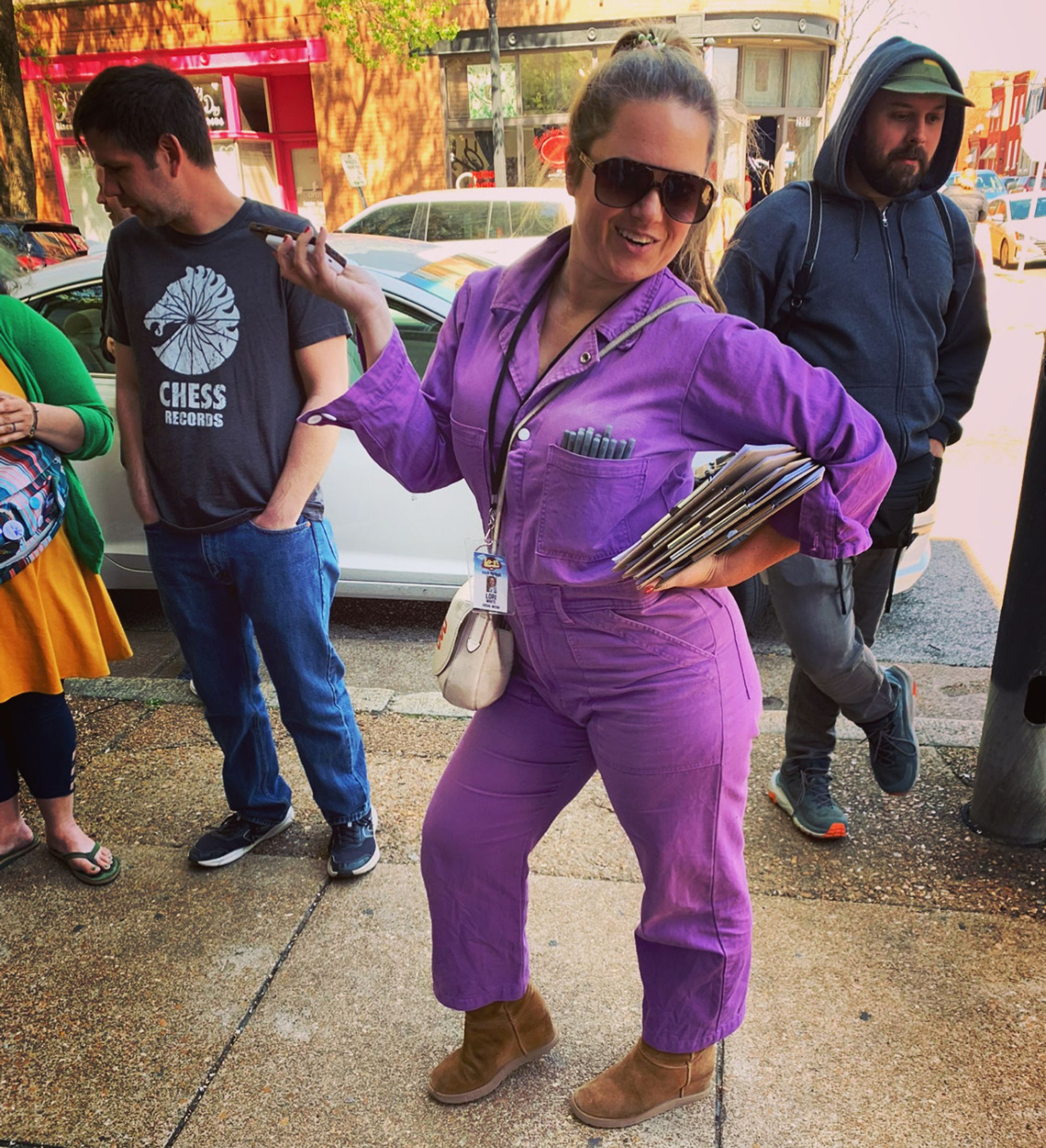
ORIGINS
Who are you, where are you from, and where are you going?
I'm Lori White. I was born in Tupelo, Mississippi. It's the hometown of Elvis. But I really claim St. Louis as my hometown. I grew up a little bit in the boot heel of Missouri and a lot in St. Louis. I went to the University of Pennsylvania in Philadelphia. I was an overachieving millennial public high school girl.
I lived in New York for 15 or so years, give or take depending on the pandemic. I worked in tech, largely content strategy, copywriting, and now I work in user experience. It's not a coincidence that “user experience” is where I landed in my career. I worked at Daily Harvest during the pandemic. And one of my main projects was figuring out how to help people cancel or pause their food mailing. Their freezers were getting too full, and they couldn't eat it all!
User experience is something that I really enjoy doing and it's something I really think about a lot, whether it's canceling your Daily Harvest order or asking why doesn't the train go from Chicago to St. Louis to Memphis to New Orleans? A lot of people went up North so the trains go that way. So why can't they go back down South? There isn't a train from St. Louis to Memphis. What's going on there?
About a year ago, I moved back to St. Louis from New York as I was sort of contemplating my late thirties in New York City. What does that mean? I think I was ready for a change. People ask me, “Oh my God, do you miss New York?” I miss the density. I miss the livability, you know, the laundry service, the train… I took the New Jersey Transit to SEPTA to go to my college reunions. But I wanted something completely different. I'm both new to town and old to town, because I am very connected to St. Louis. I lived here a little bit after college when I was burnt out from the Ivy League. I've been saying Ivy League to you a lot, and I want to emphasize that I don't care. However it’s important for painting a picture of my radicalization.
It was my really first introduction to real, real wealth– the kind of wealth that makes you oblivious to a world outside a certain kind of privilege or experience. Penn has some of the smartest people in the world, yet when they heard I was a white Missouri Christian, I was often perceived to be some kind of Republican evangelical who hates Jews. Dude, I’m a Methodist–the chillest of Christians! But that was my first real introduction to how smart people can be pretty stupid and make a lot of assumptions about people from fly over states. That radicalized me.
In what way?
Our institutions are not infallible -- especially the elite ones may market one thing but be another. The marketing of America isn't a documentary. It's a fictional movie.
I discovered at Penn how “tracked” you can be into a career like consulting and Goldman Sachs–which seems so obvious to some! But I'm a public school girl from Missouri. I was the first girl to get into Penn ever at the school. It seemed like a good thing, a ticket to the top! But I also know that nothing is promised. Behind this locked door I got through was another set of locked doors.
There's a thing in higher ed called "the hidden curriculum" — and it's largely described by people outside of the classic academia stereotypes watching others float through that world like they have access to a hidden rulebook. It turns out it’s not bitterness or an inability to keep up, but these folks floating through DO know hidden rules. Because they learned them from sources most people don't have access to — family, wealth, privilege. They know whose classes they should take, what their thesis should be, what recommendations really matter, etc... I found some shortcuts and had as much fun as I could, but I never found the hidden curriculum — largely because I believe Penn was built specifically so that people like me (public school girls from fly over states) and especially historically disadvantaged groups would never find it. And I wish more people knew this.
Anyways, after being there I had to return back to St. Louis and understand what to do with my career. I got to know people who were just artsy and weird… not paying a lot for rent and being interesting. I was 23 and there were 33 year olds starting businesses. Yet I still couldn’t find a job in St. Louis at the time. I thought, “There is a brain drain and I’m a brain and I’m not draining so it will be great!” But no, the town was already brain drained and it was set up for the people who stayed. There is a legacy system here in St. Louis too. It was really hard for me as a young professional to find a way into St. Louis. Cut to, I moved to New York: city of density, city of opportunity. I struggled in my career in New York, but there was always an opportunity, someone to meet, someone to do some go-gettery. And I love that energy in New York. And I brought it back with me to St. Louis. I think my friends here appreciate my intense follow-up.
It sounds like you were part of two legacy institutions, one being Penn and one being St. Louis. And now you're kind of disrupting it all.
I would love to. I mean, let's see what we can do. I was listening to Adam Conover – media preference reveal! I was listening to his podcast and he was talking to Jenny Odell, the author who wrote “How to Do Nothing.” And she talked about this concept of “Bahala na” which comes from the Philippines. Its a concept that’s like a positive response to uncertainty. I kind of “I accept this. Now what?”
When I say "we'll see what we can do" with these sort of disappointing institutions, I really think of that concept. Jenny mentioned that a psychologist at MIT looked into this concept and deemed it a uniquely Filipino concept born out of the fact that this is a culture of folks who live next to volcanoes and in the middle of typhoons. So they have to accept the uncertainty of living on a volcano, but they also find a way to go ... "ok, but what's next?" To find joy.
My mom was really into astrology and she would look up our birthday and who was born on our birthday. I was born on the same day as Nero, fiddling as Rome burns. And I always wondered, “What does that mean?” In the last year or so I realized I will also help Rome, but I will fiddle if that's all that's left to do. I would probably also be fighting the fire. But I would want to fiddle on the way to the fight.
You have people motivating the firefighters, and fiddling helps.
In my high school years, I was a pom-pom girl. I love cheer and spirit. That's who I am. I'm like a cheerleader, an intellectual, a disruptor. I don't know.
“White” girl from Mississippi slash Missouri.
“White” girl born in Mississippi. With my name, everyone's like, “L, will you ever change your name?” I'm like, “No, I love being a White.” I have my dad's name and I got to see the ways my dad got to kind of interact with his name. He would use his name as kind of an icebreaker, disarming people with, “I'm White.” His name's Ben. And he was like, “I've ‘Ben White’ and I'm gonna stay that way.” Or “I've ‘Ben’ White, I'm Ben White, I will be Ben White.”
He grew up in rural, rural Missouri, but like, because it was so rural and poor, like he had a more diverse class than you would expect. He had black friends. Missouri, especially the boot heel, has a lot of diversity, but you wouldn't know it because everyone's segregated.
What’s the racial dynamic like in St. Louis? Can you describe this “city” versus “suburb” dynamic for those who don't get the context of St. Louis?
There's like a couple of different St. Louis's, all in clusters – the product of redlining and religion and history and slavery and everything. I was born in Mississippi. We moved to Southern Missouri and then in second grade we came to St. Louis. The cluster I grew up in is a suburb called Kirkwood, also where one of the oldest Black settlements is. My elementary school there wasn’t segregated like other parts of the state. People have Black or white friends, and they don’t really think twice. It’s a natural thing. My mom is from Kirkwood so she moved our family back there knowing I would be raised in a more diverse, tolerant place.
The Northside of St. Louis has many historically Black communities, but wasn’t always that way – that’s a redlining situation. Then the South side is more white. However, my current neighborhood, one off Cherokee Street, was traditionally German but became more – or maybe was always, I don’t know– African American. My neighborhood also includes a lot of immigrant populations, mostly Mexican. It’s kind of like the slow cooker of everything.
When I lived in Greenpoint in Brooklyn, it was Polish, then hipster, then rich people. All those people did not have a lot of sustained simmering together. It was just, these people kicked those people out and boom. In St. Louis, because there is actually housing and thus there is more mixing. Maybe that is my anecdotal experience though. For instance, when there are Cinco de Mayo parties, it won’t be uncommon for you to see a Black family wearing sombreros and celebrating with Mexican immigrants.
My more “elite” friends may think all this is surprising because they have an idea of what St. Louis is because of their media diet. But how could you taste this delicious, rare dish of St. Louis because we're not on a lot of menus! St. Louis the city is a very Black city. There's amazing Black leadership. We also have very famous universities. Washington University of St. Louis. Jesuit University.
I’ve thought a lot about race dynamics throughout my upbringing – maybe from my last name – and I’ve said, “Well, it's nothing new to me. I'm not afraid of CRT (Critical Race Theory) or whatever. My whole life has been CRT.” Not by the official definition of course, but I had to talk about racial inequality my whole life, from childhood onward and I never felt bad.
You are proof that the kids are gonna be all right if they are taught about racism from a very young age.
My high school principal, his name's Franklin McCallie. I don't know why he was brought to be the principal, but he really was very outspoken about racial politics and racial tension. He came from Chattanooga and he was open, saying “I used to be racist, explicitly. Like whistling Dixie from a rich Chattanooga family. Segregation.” Now, some people whistle Dixie fairly innocently, not knowing its more sinister origins which are essentially a national anthem of the confederacy, a longing for the days of the Antebellum South! But McCallie had some sort of road to Damascus moment. He changed his views and then ultimately integrated his father’s private school.
I had a model in him. He was honest about how racist he was and how bad it was. He told you that racism existed and it was a problem. You couldn’t attack him and say, “Well you are a racist who whistled Dixie.” He acknowledged his past and how bad racism was before you ever got to. Our whole school had him as a model. He was committed. People still talk about him at the reunions! His story is very Google-able, about his move back to his hometown.
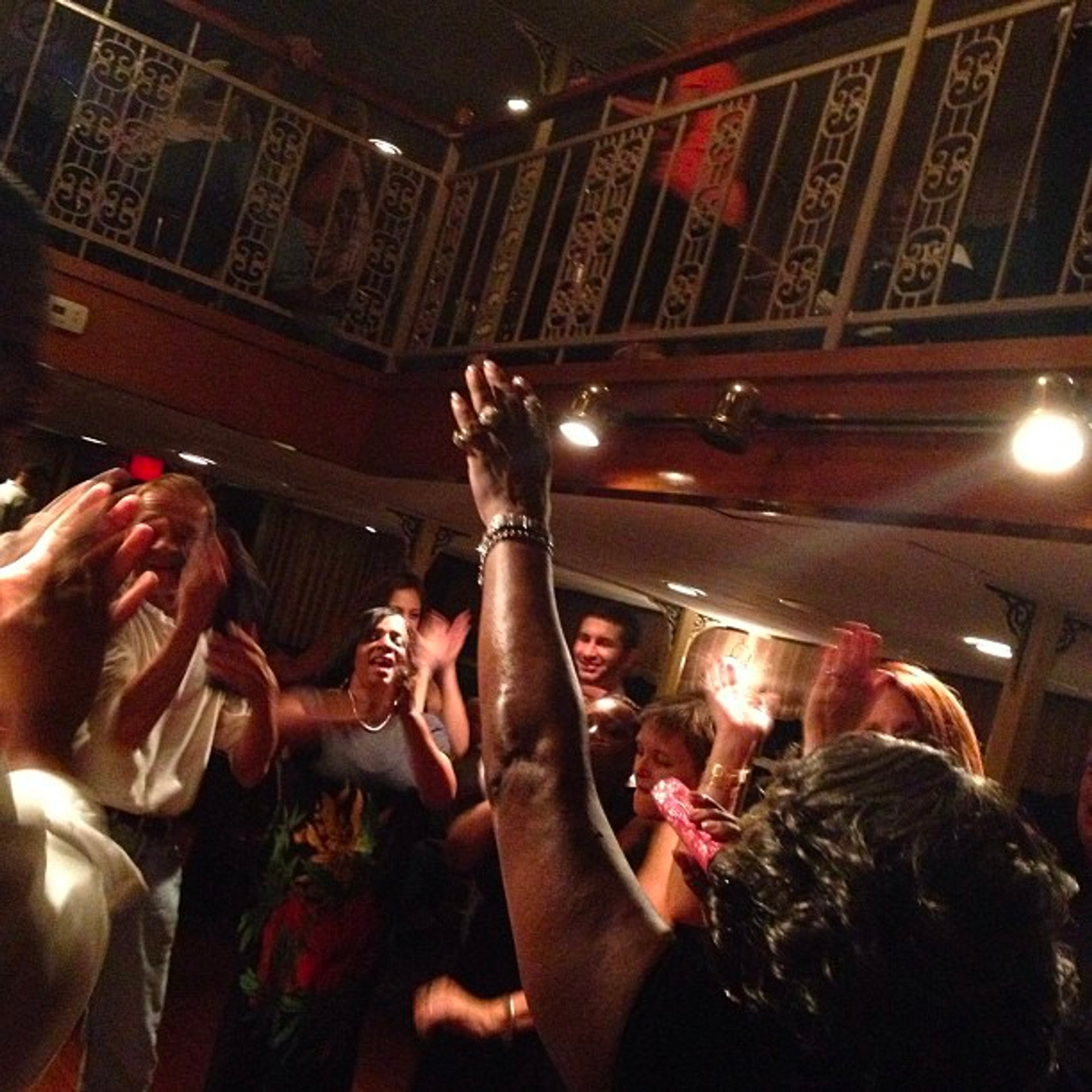
Lifestyle
What is your favorite thing made in America?
Motown. Hell yeah. Motown to me is everything. I think maybe Barry Gordy, he said something like 99% of the talent in the world is untapped and unsupported. He said he knew that Detroit had at least 1% of that talent. And so he committed to support it and he made a system to do so. A lot of the talent came from the Deep South, given migration patterns, the Flood of ‘32. For folks landing in a place that was having this post-war boom, I think there's something interesting in creating a system to allow people who never had a garage to practice in, to practice in a garage. People who couldn't really afford to buy a soundboard could get access to a soundboard.
I see this as what happens when the economy is working. When systems are working. This was a Camelot moment, this blend of everything that you’re not gonna get anywhere else in the world. You had people stolen from their country, who landed in Mississippi, somehow survived and created Jazz. Then they move to Detroit. They were able to get jobs and raise a family in Motown. Motown is so joyful. My cat Marvin is Marvin Gaye. His sister is Tammy Terrell, the singer of “Ain't No Mountain High Enough.”
Motown is like a sustainable resource. We hear the sound everywhere now. But it's simultaneously so American– you aren’t gonna hear these sounds coming out of China. Motown is also a magical thing that came out of the policy, a system of sharing resources.
Before our interview started, you were talking about working in the shadows a little bit, wanting to support people and you're kind of in your own Motown moment. You’re in St. Louis – you want to promote it, share it, and grow it. Maybe you aspire to be Barry Gordy, finding the unsupported talent to support.
My mom famously makes anyone who comes to our house watch this documentary called “Standing in the Shadows of Motown: The Story of the Funk Brothers.” I think maybe this is how I started learning about Motown. The Funk Brothers were the house band of Motown. They were on every album. They were a shared resource.
When I moved back to St. Louis from college, I put on my rose-colored Motown colored glasses and saw people doing amazing, very off the map kind of stuff. They make art that you’ll never see on a Pinterest board. You just won’t hear about them because they aren’t tapped into some New York media amplification system. I tell people, “Think outside the arch!” There is more to St. Louis than that arch…
I wish I had the business acumen and brain of Barry Gordy. But I really like that there was a person who would plug in people who would otherwise be singing in a church. The best singer I ever heard in my life was in church. I’m in a gospel choir. We go around other churches and it's definitely giving Motown!
But yes, in St. Louis, there are leaders, artists, sportswear designers, DJs, rappers, and yoga teachers, council people and exotic plant stewards. If you live in New York and do any of that, you will probably get attention for it at some point. You know, I know this exotic plant enthusiast here and if they were in New York, there would be a culture piece on them in the New York Times. Maybe because I come from New York, I see the urgency around making your thing, making your mark, hustling to get attention. People here are just expressing themselves regardless of attention.
But also, St. Louis has the highest per capita number of nonprofits. People are also here to help. There is so much energy, but also a lot of disconnection. A lot of these organizations may serve different communities in the same way, but don’t communicate. I’m on a listening tour, hoping I can be a point person for sharing resources.
For example: the way the city and county is set up, we don’t have a lot of tax money in the city. So there are a lot of potholes that go unfilled. There’s an artist here who got a grant to fill in potholes with little mosaics. I also secretly fill in potholes for my neighborhood association. When I was talking to this artist, I said, “Girl, I have the GOOD pothole filler, have you heard of it? Do you wanna share resources?” She was grateful and explained how many people yell at her for filling in potholes without the consent of the city. I say to her, “Don’t listen to the haters. Most people are happy to not have a pothole but you’ll never hear from them. Let’s just share resources. Take this good pothole filler.”
Nothing like sharing resources to get people to open up.
We're a sharing resources kind of town.
It's your Motown spirit. You’re sharing the Funk Brothers of pothole fillers.
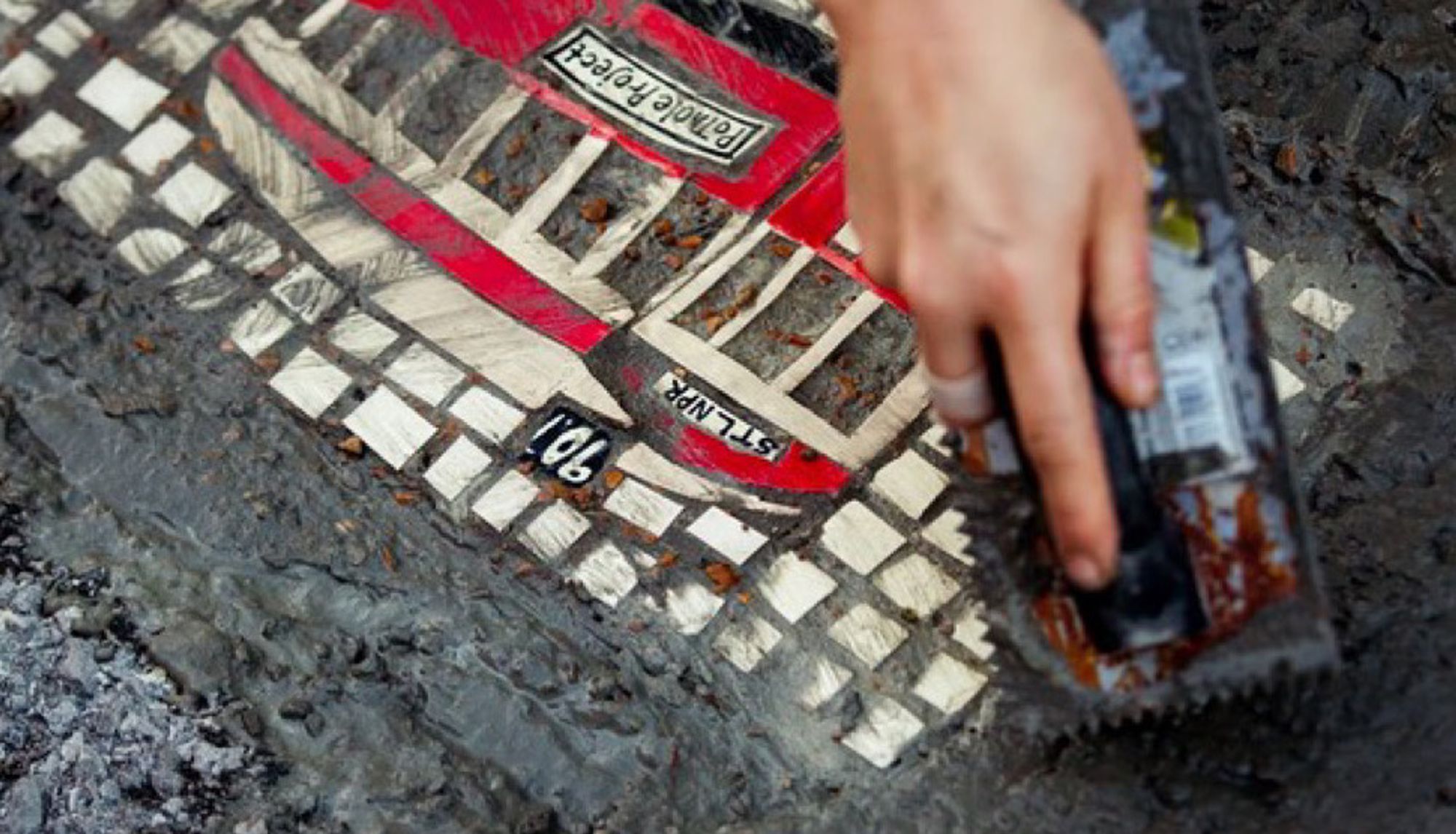
Craft
Do you have a vocation or a job?
I have something of a calling, a vocation in user experience. I'm a content designer. I’ve always been about making words and data work together, to make a better product. Early in my career I worked in marketing, making messaging so that it performs well for people. I also worked in film marketing, asking “How do we get people to come to put butts in seats? What kind of messaging and events make that happen?” What words or experiences make action occur?
Ellul’s literal definition of propaganda.
I pivoted professionally into the world of user experience, where you’re trying to find the ideal outcome for a user. These days, I work in user experience at a big bank helping folks manage their investments.
Do you think being a content or user experience designer reveals parts of reality and ways of using products that designers themselves don’t even see?
Absolutely. The train thing was a good example. Because of the migratory patterns of Americans in this part of the country, the trains go South to North. People from Mississippi want to be in Chicago and Detroit. But these days, there's no train from St. Louis to Memphis. Like there's not a route that goes straight down! My thinking, for better or for worse, really interrogates and reveals purposefulness behind design. Who is this outcome serving? Even if it's just like willful ignorance, a lack of wanting to talk to Tennessee, or maybe it's not wanting to connect historically black powerful cities?
I like to ask questions about design that often come up when you’re building user experiences. Famously, I would always plan my sister's parties in DC. I always stressed that we had to put the drinks at the other side of the house so that people wouldn't stop. They have to keep walking. And they'll meet people as they walk. It keeps the flow going. We want people to meet at the party, not just drink at the party. That is an anecdote about how I’m always thinking about user experience.
And so if there's not a train that connects St. Louis to Memphis, what's going on there? Like what do people want to happen that's happening as a result of those cities being disconnected and what's not happening they don't want to happen as a result of those cities being disconnected. There's a lot to say about how Chicago wants to be the hub even though it's not in the middle of the country and that St. Louis would be a better hub. I'm really trying to make St. Louis the high speed hub of America!
Why were you even studying railway directionality?
In the town I grew up in, I really loved trains. It had one of those old school train stations. Maybe I just have a proclivity for trains? But we couldn’t take this train to the Arch. It stopped well before it despite literally being able to see the Arch directly down the tracks. You’d have to get out and drive there. As a kid, this did not make sense to me.
Yet having moved to the St. Louis area as a kid, I had never seen escalators till I was like 8 or 9 years old and I found escalators and trains absolutely exhilarating. A friend down the street from here runs a sportswear company and we both had this childhood experience moving to St. Louis. We both couldn’t believe there were trains and escalators and a zoo… plus you could walk to get an ice cream cone then walk to get a sandwich!
But really, some things that seemed obvious that you could do with trains you couldn’t. Well it seemed obvious to me as someone who likes user experience journeys and tangible uses of things. And with trains, it's a literal user journey. Why can't I go to Memphis? My godfather lives in Memphis. I wanna go see him.
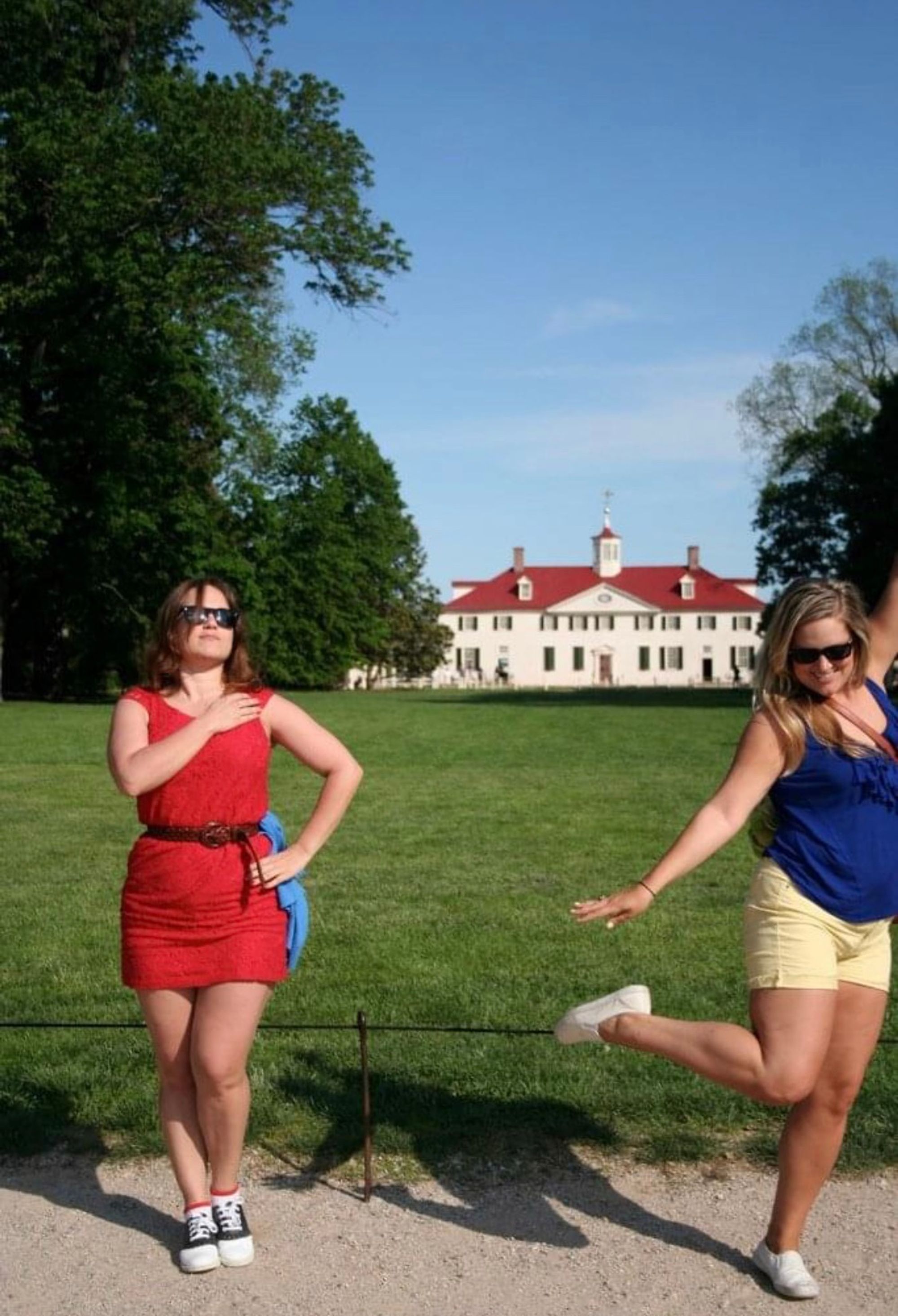
Identity
Is well done better than well said?
I think done is better than said. I just had lunch today with another neighborhood association person whose side of the neighborhood became a kind of cultural-art-party center. It’s where our Cinco de Mayo parties were. There is dancing. There are parades. It inspired me to think, “I’m just gonna do it. Forgiveness over permission.” So now, whether it’s string lights on the street or closing down the block for people to hang out, I’m just gonna put up a cone and let the chips fall where they may! I’ve even thought about buying a speed bump at Home Depot to put on the street to prevent cars from zooming down it …. If the city decides to take away the speed bump now we will know that the city has time to take one away but not build one!
Even in electoral politics, I think of ways to get involved beyond voting. What could I offer, and just do? Take for instance Deb Lavender. She is now a Congressperson from Missouri. When I had approached her, she had just lost an election. I grew up knowing about Deb because she was running to beat really right-wing evangelicals and won. After Trump got elected, I wanted to find ways to get involved instead of just bitching about stuff to myself. I saw that Deb had lost her election and I thought, “Her Instagram could be better. I have time and energy. I used to work in a lot of social media marketing, data, key words, user experience. Let me see if she needs any help.” So I just emailed her and asked if she wanted help with her Instagram. I mentioned that she knew my mom. Ever since then, I’ve been meeting with Deb for an hour a week for almost two and a half years now. I call this “Adopt a Politician on Instagram.” We go over posts together but after two and a half years, I have a sense of her preferences.
This is a great example of “doing over saying.” It has also helped me because whenever I get kind of sad about what people are saying about Missouri, about Democrats, whatever – I find it amazing to have my own little piece of the pie. My own little project. Just calling my Senator wasn’t enough for me. It wasn’t giving me whatever chemical comes when I work on a post for Deb about a new petition or initiative. There are so many states where conservative factions are trying to take away rights of the people on ballot initiatives. Local politics matter. Look at Ohio recently with their initiative!
It feels good to teach and elevate information to Deb’s followers, information that may otherwise be kind of hidden in the mess of media. She has about 4,000 followers, pretty much all of them are from around Missouri, a lot of progressives. Yet Deb appeals to people across the spectrum– some are hard core Democratic Socialists and some are more Joe Biden liberals and some are basically Republicans who just love Deb. So yes. Her name is Deb Lavender. She always wears Lavender.
This also allows me to express a different side of Missouri that lots of folks don’t see in national media.
Isn’t Ferguson in St. Louis? That certainly gets a lot of people talking about civil rights!
Oh, it's like civil rights movement 2.0 down here. And it began here with my neighbors! All these media bros came to Ferguson, hanging out at the local McDonalds where I would go with my friends. They were all acting like… they’re in a war! No bro, you’re not in a war. You’re in an old town where there’s a train station and a farmer’s market where people are fucking upset that their neighbor was killed.
Yes, there have been race riots in St. Louis – if that’s what you want to call them. There is a lot of unrest. But I see it as this: we are close to each other and we care about what happens. I know people who knew Mike Brown. They’re my friends. The reason everyone is stopping the highway, protesting, it’s not because they’re more prone to be angry or something negative. It is because they care about what happens to their neighbors. We know our neighbors here. Yes, we are a segregated city. St. Louis has a lot of segregation, one of many American curses, but we are also the ones that get mad first and care out loud about that. So yes, I know the people who were part of that movement. They’re my neighbors. We party together. We care about each other deeply – St. Louis is very special in that way.
Mike Brown and Lori White and Deb Lavender. I'm starting to think everyone in St Louis has last names that are colors.
Spirituality
Progress or return?
I’m a livable cities girl. I want the train to go to Memphis. I want to get my coffee at 7 a.m in a nearby cafe. I want to walk to see my friend. I don’t want to get run over by fast cars. I have a friend who studies historical preservation in cities like St. Louis. We talk about “vernacular architecture,” or architecture by people who maybe aren’t professional engineers or architects but are building because they have to, through trial and error. It is what happened in neighborhoods like mine, historically. I live in an old German neighborhood. There were corner stores and no cars but street cars. These people were living the Danish dream, little did they know! There was even an old utopian community here. Yet through the years there was red lining and such. Now the neighborhood is figuring out what it needs to be. Is that, “progress or return?”
I think you need to have both. There are a lot of cycles. It is very “road to Damascus.” Like every year, there is the story of Pharaoh and the Jews and Passover. I listen to a lot of people who study the Hebrew masters and are interested in what those civilizations could teach us through the Old Testament. One of my favorite scholars is Rob Bell who is a Christian preacher and one of Oprah’s friends. He talks about these cycles.
Is he also Methodist?
Methodists would be way too relaxed for that degree of serious studying. I mean as a Methodist, I’m a very relaxed form of Protestant. But anyway, I think about these cycles and how they impact my neighborhood. Where did society go wrong and lose track of what is good and have to repeat cycles in order to get it right? We had this great city with streetcars. Then we got way into cars. Now it’s like this poetic purgatory torture where its like, cars are running us over but we wanted them to save us.
My friend Michael looks to history to find a way of how to move forward. He puts it in so many words like, we have to recover (search for, bring back) the past to recover (as in "heal") from the past. So I do really try to apply that framework when I'm griping about how things ought to be. For instance, I look at my neighborhood. Here I am, in the neighborhood association, filling my potholes in secret. I look at old social clubs that were basically insurance companies for each other and the community, offering services where the government wouldn’t. I think, “Hmmmm that is an old school way of solving a modern problem.” I’ve considered what it would look like to establish that.
This “looking back to move forward” also works with streetcars. Where did they go? That could tell us about the kind of bike lanes we want. Even if you look at the highways, many of them were made from old indigenous trails – did they “accidentally” do a bit of looking back at history to build something for the future? Look, going back isn’t just about repeating. There is a third way. You can’t have progress without the return, because otherwise you’ll get this “Make America Great Again” energy of returning to a dream that was never true, or maybe just true for you. But you were five years old.
Granted, I had this childhood dream to return to a St. Louis with streetcars. There was a World Fair in St. Louis which looms large in the imagination of many St. Louisans. There are even songs about the trolley during that time. So yes, we have to have both. The past inspires the future, we learn from the past for the future, we correct our mistakes.
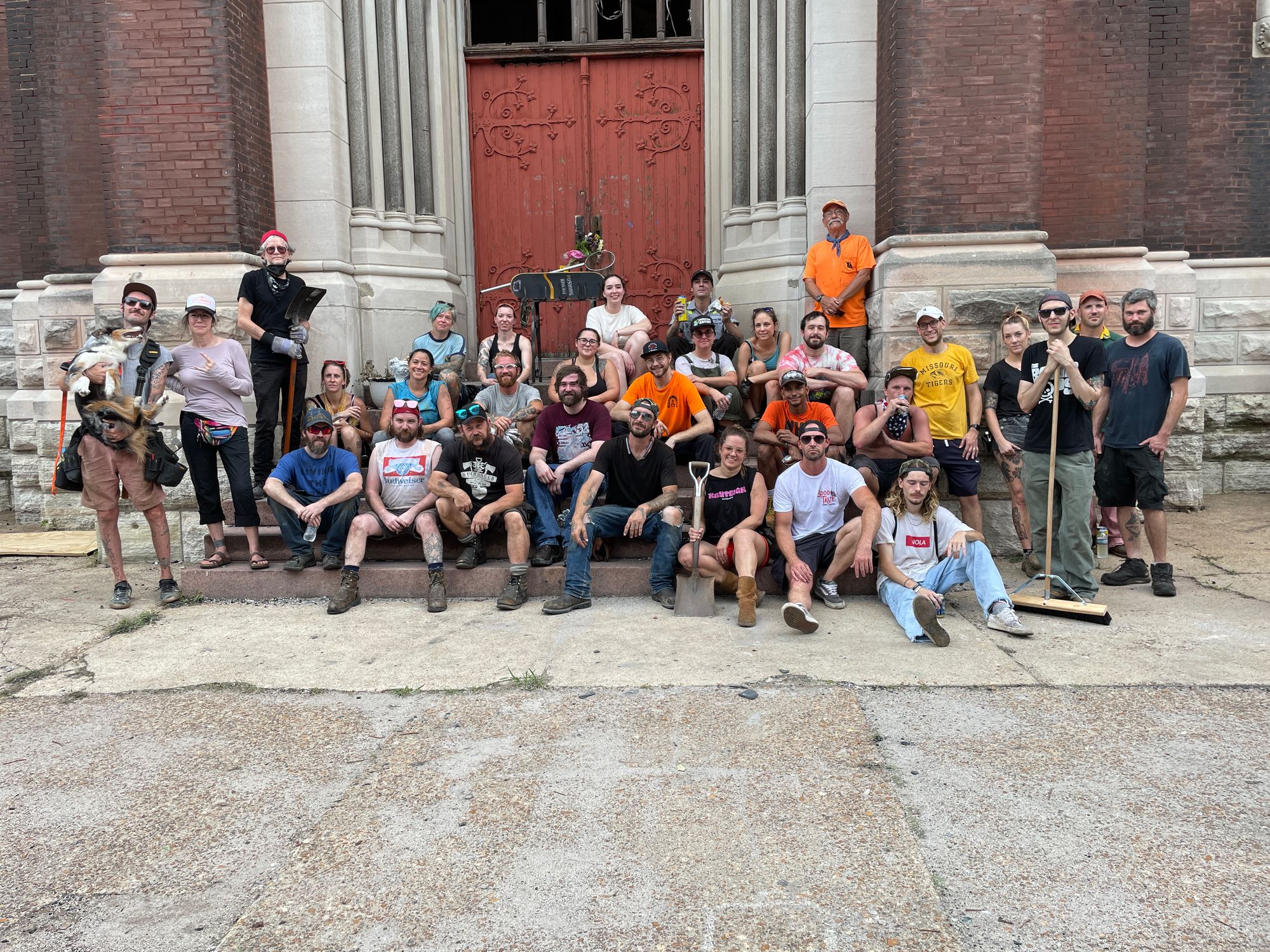
Knowing
Is there something you know that you wish everyone knew?
I wish everyone knew how stupid “smart” people can be. I see this a lot in St. Louis. Lots of people need to be reminded that just because someone is from some kind of “smart” institution doesn’t mean they are smarter – take them with a grain of salt. I believe in the “They won’t save us, we save us” vibe.
The American Dream isn’t like, turn it on and boom! You’re there! If I ever had a crisis of faith, it was in the American Dream. Nothing that I thought that worked, works. Maybe this comes from my Ivy League radicalization. There is not some kind of “plug-and-play” boomer vision of going to college, getting a job, and succeeding – even if that is what I was raised with and believed. Now I believe in listening to authority, but learning when you can and cannot trust it–a healthy skepticism. Just because someone comes from “power” doesn’t mean they are smart.
Perhaps there is a kind of Pollyanna Midwestern, hopeful girl side to me. I want everyone to know that they can have better, more powerful interactions with power. Folks shouldn’t see power- or money- or business-people as anything other than people who happened to come into whatever they came into. Maybe other people had strong grandpas who taught them that lesson, but I had to learn that myself. Now when I go into these spaces, I think, “I have a lot. You have a lot. Let’s talk. What’s going on? Let’s share resources.” It is important to remind people that when you talk to someone who has more power than you do, remember you also have so much to offer. Just because someone comes from some bright shining blue blood family name of St. Louis or whatever, who has more money or resources, it doesn’t mean they are smarter.
Basically, I encourage people not to kiss rings, but if you do so, do so willingly and knowingly.
It also goes the other way. Sometimes people think the business people or the experts have all the answers to save us. But also you can buy some kind of conspiracy that all those Ivy League people are powerful enough to run some deep state power cabal. Yet I went to school with “those people” just like you. There can’t be a conspiracy because bureaucracy often has a lot of incompetence or human error.
Yes! That is when I say, “No, they're actually stupid sometimes.” There are beautiful, well-meaning members of wonderful, elite organizations, universities, or corporations who are bad at email.
But it also goes the other way where people can get really anarchist, anti-establishment. I have a lot of friends who say, “I hate the flag. I hate America. America sucks.” Maybe it’s my Methodism– just being very middle of the ground, not extreme– but I think all of these power relations have to be informed by context and history and neighbors. You can’t assume everyone with power is intelligent. But you also can’t assume all rich people are terrible, no-questions-asked-assholes.
The important thing is to not be hypnotized one way or another by them. Don’t waste your time hating them unconditionally or loving them unconditionally. Whether it is about the flag. About Joe Biden. About Donald Trump. Just chill with it! Our work, my work, your work would be a lot easier if you’re not dealing with these Facebook-commentified extremes of emotion. We could be hanging out, maybe with a fire outside, birds chirping, wind flowing, not yelling at each other and trying to get this pothole filled. We aren’t trying to be super anarchists or establishment shils.
You know, talking to you is crystallizing some philosophies of mine, which are about more doing than saying – so I guess I rarely say them! I guess I’m about that life of sharing resources with pothole-mosaic girl. I love the academic debates, but also I like to speak in layman’s terms.
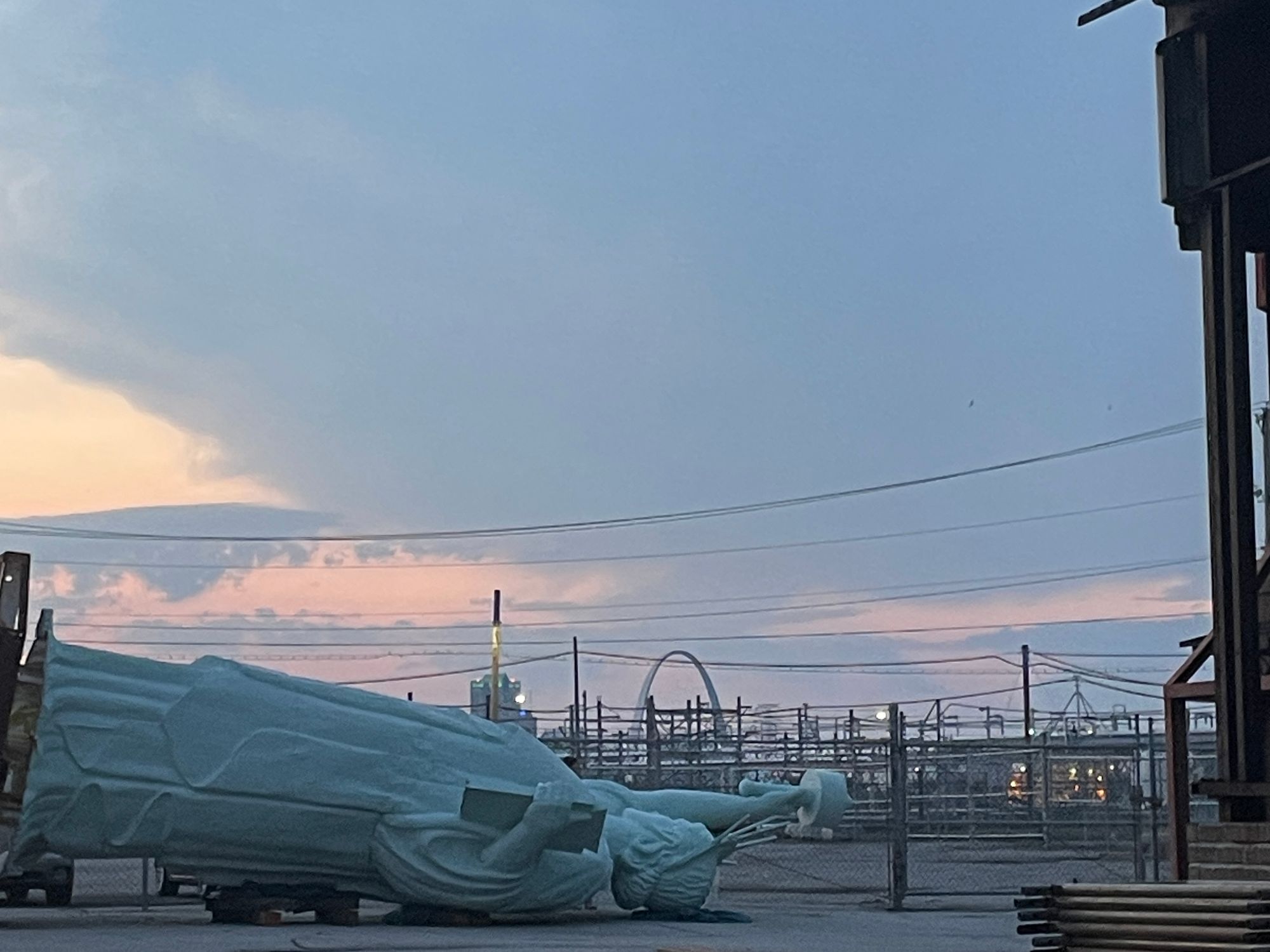
Meaning
What is your favorite culture war battle ground?
Look, so much of the culture wars are fabricated into some kind of propaganda that isn’t actually a war. It’s just whoever has got the microphone. Like with the trans issues. There are so few trans athletes in the state and people usually tend to work stuff out on a local, case by case basis. Most people think trans folks are fine. Really, most people are thinking about kitchen table wars, not culture wars.
But if I had to talk about culture as having a battleground, it’s definitely like the battle of the Hillbilly Elegy concept of people in the South by elites. Like thinking “Arkansan-cousins” and “Missouri-Misery.” There is more of a flyover state war. I guess that’s my culture war. It is funny because Jason Aldean who sings, “Try that in a small town,” has a song called “Flyover States” which I listen to in my car and cry to. I love that song. Would Aldean be happy that I love that song?
I guess it's the ignorance of the coastal elite. An ignorance war that I was drafted into and did not join willingly. This goes back to the Penn of it all! So here is a story. When I graduated from college in 2005, there was Hurricane Katrina. That happened in Louisiana. Yet I got multiple calls from people from the University of Pennsylvania asking if I was okay from the hurricane because the whole time they knew me, I thought I was from Louisiana. Because of… “Louis.”
I would love it if it was because I have such a Louisiana, laissez le bon temps rouler spirit. I don't. I'm a St. Louis girl. I don't act like I'm from Louisiana. I don't mention Louisiana. I'm not from Louisiana. This is one of those moments where the cultural, coastal people are actually dumb. They don't mean to be dumb. They're like dumb in such a unique way that's not stupid, but it is dumb. I would respond to them saying “I'm from St. Louis and it's pretty far from the hurricane area. It's thousands of miles.” People would say, “I don't know where any of those states are anyway.” And I would think, “That's rude! But also… dumb.”
You know lots of folks thought that Ferguson wasn’t in St. Louis, that it was just some random town in the middle of somewhere where people were mad. It’s ignorance of flyover states, chunking it all together. I love IWR because I don’t want people thinking that St. Louis is Louisiana and calling me during a hurricane when I’m so far north and completely dry. That was almost 20 years ago and there has been such little shift. If anything, there is not just disconnection but disdain for the “Missouri-Misery” – which wasn’t even a thing 20 years ago but now I hear people parroting it from the coastal elite types.
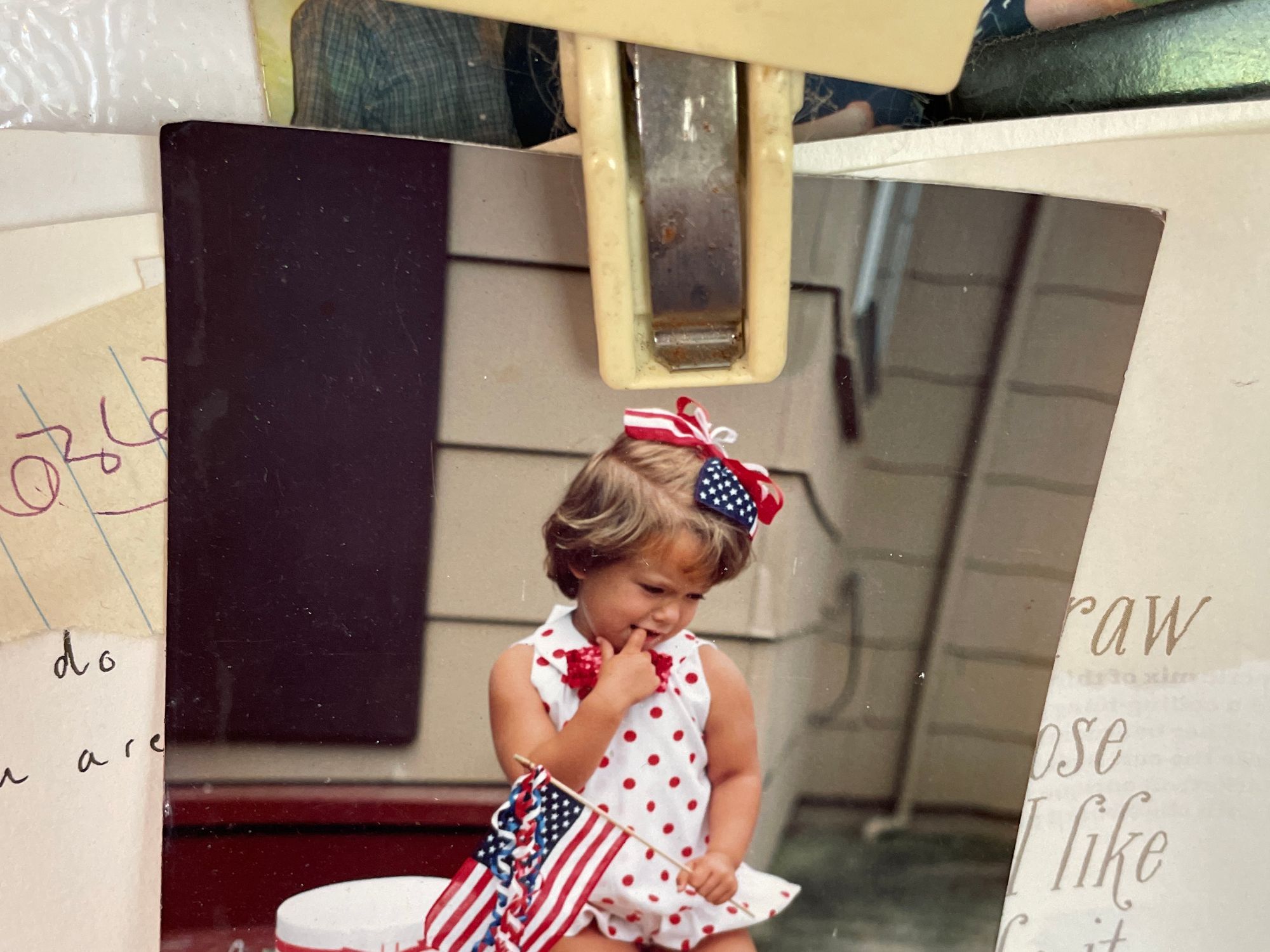
America
How do we capture the flag?
I was talking with someone at my bowling club. She lives in my little hometown suburb outside of St. Louis. She's a millennial mom. She's very cool. But they have a 4th of July parade in my town. It's a kid parade. There's a lot of flags in it. My town has old fire trucks, train stations, farmers market – Bedford falls vibes. There are American flags, not Reagan-y. This started before Reagan. You know, this parade is a 50s, 60s tradition, not an 80s tradition.
Anyway, she said she didn’t like it because they wave the flag and she isn’t patriotic. Okay fine. You can be whatever you want. But I thought, “What is this?” She was talking around something and I flat out asked, “Why didn't your daughter go in the parade? Do we not like parades?” And she said, “We don't like flag.” Look, I was a pom-pom girl. I love a fun moment. Let's have fun. Let's lighten up. On the other hand, I'm very deep, I cry at night. If there's an opportunity to have a parade and wave a flag and have a good time, I’m in.
There is a lot of literature looking into the importance of joy in movements. There are also these unique expressions of joy in African American tradition. There were instances where people who have way fewer reasons for joy, yet there is joy created: enslaved people essentially created jazz.
You can get into this “everything sucks and Trump is president, fuck it all” attitude, or you can go to the parade with your community. Let your daughter be in the parade. Ride a bike. Wave a flag. Use the opportunity, like my parents did, to tell your kid that Ronald Reagan sucks, but a flag is a flag.
So big reveal. Where I grew up, I was a Legionette, which is a dance team that would perform exclusively at American Legion Halls. My parents, my grandparents are in the American Legion. Like I was dancing to “Anchors Away,” tap dancing. But it didn’t make me a Republican or have hate in my heart because I was tapping to “Anchors Aways!” But I did have a great time. Recently I wound up meeting some old gentleman at an American Legion hall who gave my mom that jukebox from that hall. It’s sitting in the basement!
I was also in Girls State, which is run by the American Legion. It has a whole government of the most civic minded women of Missouri. There’s a governor. I ran for fire marshal, but I didn’t win because I didn’t know I was supposed to be that serious. I mean, these girls were like, “I’m gonna be governor.” I ended up on flag squad. Everyday I would raise the flag, lower the flag. I learned about flag code, how the flag is a “real person,” so you can’t burn it. To this day, I can’t even wear it as a cape even though I really want to because it’s not in the code. So I follow these rules fully knowing they’re kind of dumb and it is a piece of fabric. Like it’s giving transubstantiation – which as a Methodist, I just don't believe in. Like the flag isn't real. But it's kind of fun to act like it is.
So yes, I know all this about the flag. And people may think, “Oh you are patriotic, you must be Jason Aldean or something.” No. It’s a flag. It’s fun. It’s great. It’s America.
And if I’m being honest, all these conservative flags are desecrating the flag. That thin blue line flag? Technically that isn’t flag code…. The flag with Nicki Minaj, like that one's fine. I'm going to give it a pass as an American Legion Girl State flag crew member.
Our flag is just the American flag. It's pure, simple– lighten up. I love wearing my patriotic gear. I think it's fun, because it feels mischievous to wear the American flag and also support abortion. When I lived in Europe, everyone was like, “America's so patriotic, nationalism, oh!” But they weren’t like “NATIONALISM IS THE ROAD TO NAZISM!” which a lot of people now will sort of equate with “If we like the flag we’ll become Nazis.” No. There was a lot more to that. Our flag can invoke a campiness that only America can do. There is a silliness to waving the flag and tap dancing to “Anchors Away” next to a jukebox I will inherit while also saying, “Abortion on demand, no apologies.”
Look, on Bastille Day in France, they wave flags and it's not in some kind of Ronald Reagan way! Many hard core progressives, especially those who vibe with politics like it's a religion full of absolutes, are so stalwart in saying a resounding NO to all flag iconography. Like it's the 11th commandment or something. Not my vibe.
Dude, I’m not even a Democrat. I’m left of left. But I just want to see that 90s Tommy Hilfiger re-embrace of the flag in the hip-hop world. I will not be shocked if we see counterculture embrace it again. I would love it. I wish I could make it happen sooner.
I hope we're not past the point of no return. I hope we find a way back to kind of a doofy, fun, silly relationship with the flag. A relationship where the flag isn’t so… malicious. Maybe the “Birds Aren’t Real” guys will bring back the flag – I love those mischievous tricksters. “If it flies, it lies! Wake up America!” I think the flag is a really fertile ground for mischievous joy, but someone has to lead the way. Like someone could really disrupt it and terrify Ted Cruz.
Lil Nas X doing a lap dance with the American flag?
You know, that would be perfect. He would be great to appropriate the “Toby Keithification” of country music and flags and everything. Then we are all wearing flags then no one can tell who’s a Republican. I would love that.
Look, I don't know how to capture the flag. When I was at Penn, I didn’t want to wear a cowboy hat because I didn’t want people to think I was a George Bush Republican. Now I can wear a cowboy hat because Beyonce’s wearing cowboy hats. They have been reclaimed.
The sportswear company down the street from me. They're playing with some flag stuff and they're really cool. It’s black-owned, and even though it’s a new brand, it’s a heritage brand. I don't think it necessarily has to come from African-American culture, but when a black-owned business does a throwback to Ralph Lauren 90s flag wear … I’m paying attention! And I’m smiling.
I got into Bo Bundy. He's a Mexican Texan. He sings a blend of country, hip-hop.
I love that.
He has these lyrics. Something like, “I couldn't drive a Lexus because I'm from Texas. F-150 because I drive reckless.” American flags on your F-150 but make it counterculture?
I have a little American flag in my car right above my “Birds aren't real” magnet. I think, “You don't know what you're working with here, do you? You don't know who you're tailgating...”
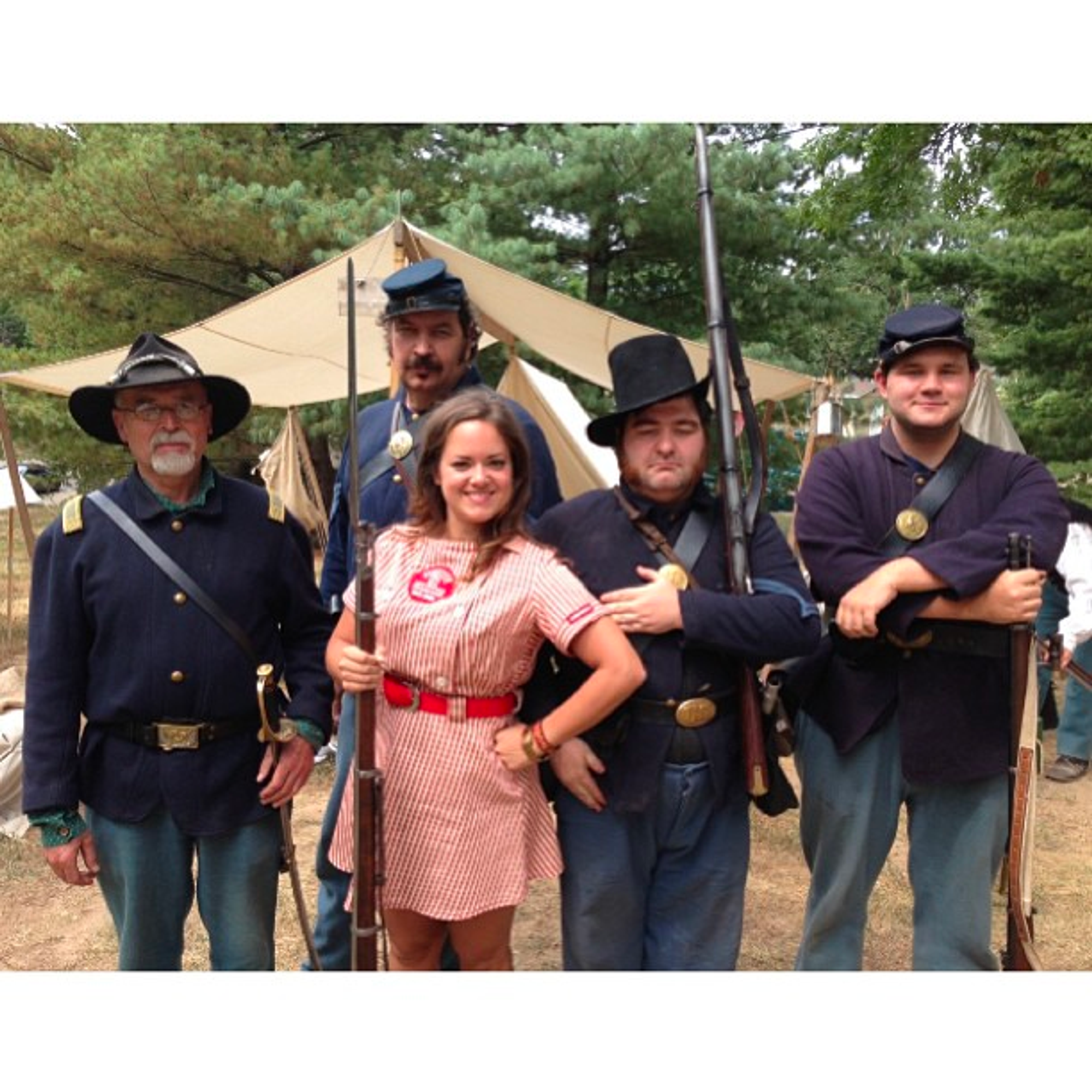
Your People
What symbolizes you and your people?
For me, it's dancing in the street. Like the first people to dance for the band and the band says, “Thanks for dancing.”
I think that symbolizes the volunteer people, the extroverts of the world. I feel there's been a beautiful introvert movement and I'm glad that they have a voice, speaking as an extrovert. But we're still here! Extroverts are often the people to ask the first question, to sort things out, to ask what someone really means.
Oftentimes, I’ll be invited to parties and when I go maybe I’ll be the only white girl, or not speak Spanish. But I’ll still go. It’s just about showing up. And it’s not just showing up for power like the “Run for office! Run for something!” types. Participation and democracy means more than running for office.
Often, I’ll meet those Trump-supporting fancy people at weddings and parties. Look, I don’t try to intentionally fill my life with Trump supporters but sometimes they come along. So there was a boat party that my friend invited me to. Suddenly I was on a boat in the Missouri river and there was a sand bank there. People were sharing BBQ. There were a LOT of Trump bikinis - a group who invited me over. I thought, “Okay whatever. I love BBQ.” Look, these aren’t really my people. But they did have this impetus to share and be in community. There was a move towards togetherness. As I looked at those Trump bikini girls, part of me was thinking, “You don’t know how progressive you are.”
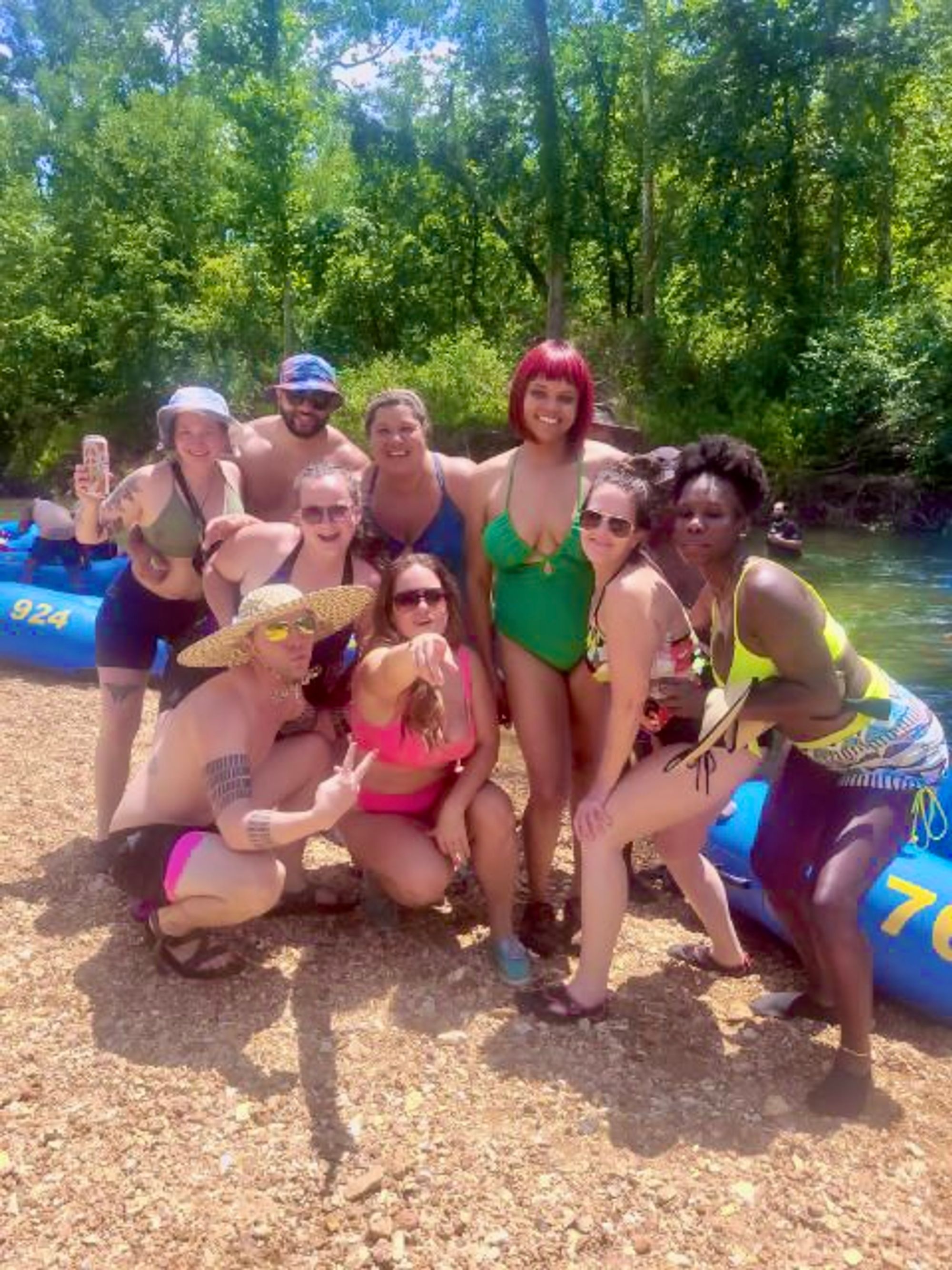
Yes sometimes I have my combative intellectual liberal days, where I want to get out of the Judy Butler and really understand gender theory. Some days I think that kind of combative thinking can be obstructionist, like it's giving conservative. It’s giving horseshoe theory or whatever.
Being in St. Louis, I do encounter the extreme right and extreme left in equal measure here. In New York, I didn’t really get that. It wasn’t even extreme left because so many people in New York are so rich that they couldn’t get far left. Or they want to be rich so they won’t get far left. Or if they’re not rich, they’re privileged in that they have a functional train – they take “left” for granted.
How can you say the Trump girls could be progressive, the Trump bikini girls?
How? Because they're in community and they're helping each other and sharing. I saw some Tweet where it said, “Anti-socialist picnic: food will be provided for free.” And you think, “Who’s going to tell them?” Like that is a socialist ethos. Like, if you get outside the academic definition, isn’t there a kind of inherently socialist ethos to get together, share, and be in community?
I think generally if you are getting out there and exposing yourself to others, it can make you more progressive. I think that’s why New York is a more progressive city because everyone is out there, meeting each other, living with each other.
Look, do I want to hang with the Trump people? Not really. I don’t like the way they voted. But I have friends who voted for Jill Stein. Are you equally mad at me for hanging out with them as hanging out with the Trump people? They both contributed to a world we’re living in today where our rights are being taken. But I’m not actively seeking out people who are pro-Trump, nor am I seeking out people who voted perfectly through their whole life.
But I think it goes back to lightening up. “My people” are light. They’re focused on joy. They’re focused on winking and tongue-in-cheek, laughing, having fun. I first said “People who are dancing in the street.” It’s like what I was talking about with that Filipino concept of “Fuck it, let’s still have joy.” My people know, okay yea, parts of St. Louis can be horrible. People can get run over by cars or get shot. But our neighborhood association is still gonna book this fun country Western concert in the middle of our Mexican neighborhood. Like, let’s have a good time tonight and sing songs about love together.
You don’t need Judith Butler’s theories of gender to just dance in the street with all different types of genders. But it also doesn’t hurt to know more about the nature of gender either.
There's a meme that I love. It was in Philadelphia. And I think it was a Motown song actually that was like playing and people were dancing in the street. It was, “Ain't No Mountain High Enough.” The meme said something like “Media: Everyone in America hates each other. // America: (shows dancing)” There were all different types of people. Republican types wearing American flags. Black people. White people. Everyone was just dancing in the street to Motown, having a good time.
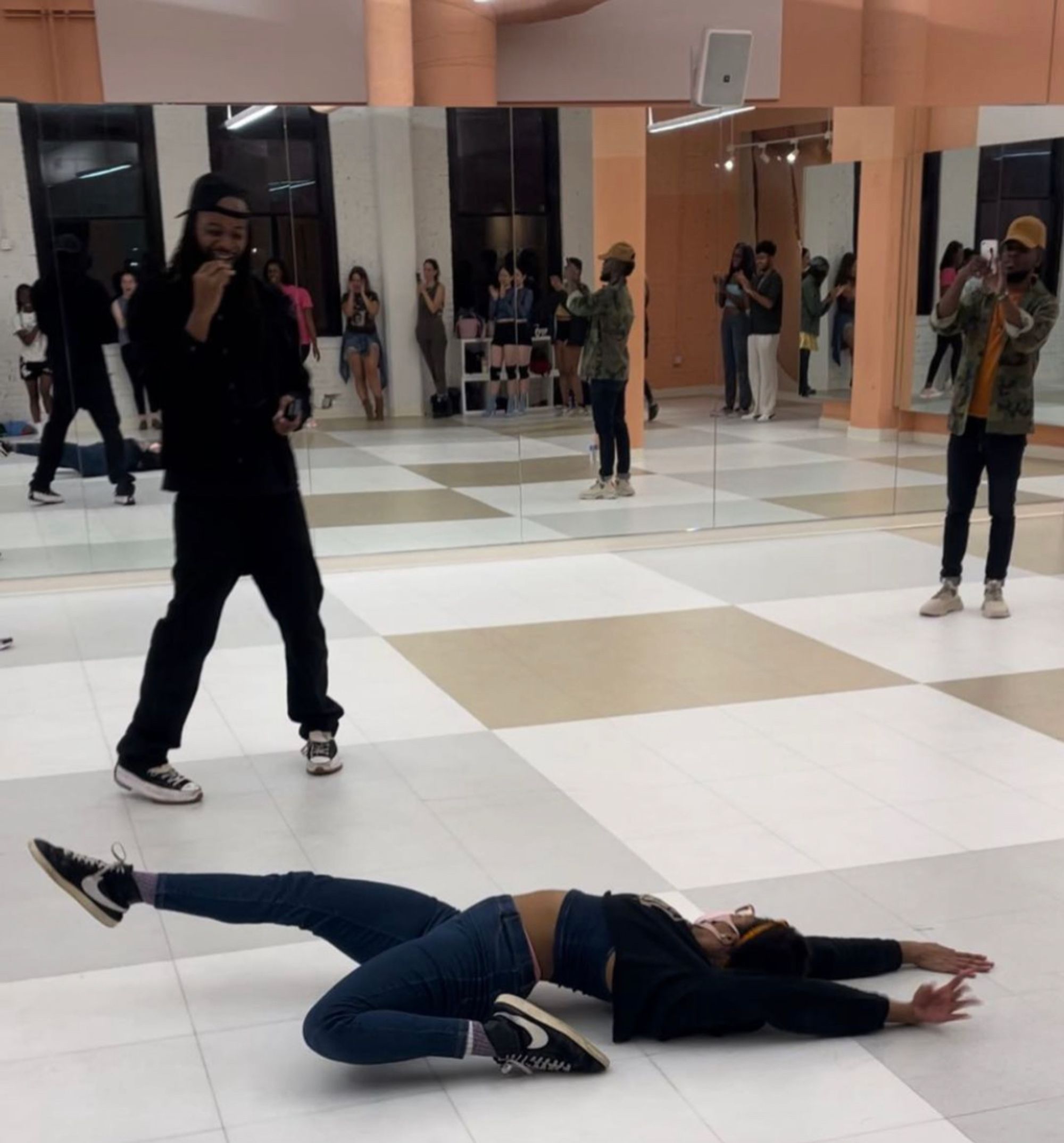
Maybe I’m trying to live in that Jimmy Carter America. Pre-Reagan, where we’re all wearing bell bottoms and listening to good music and it doesn’t have to mean anything because we hadn’t had meaning foisted upon us by Jerry Falwell or a bunch of political entrepreneurs or more sophisticated thinkers on race theory.
No. It would be like we made it through 1968. Jimmy Carter is president. Let’s party. Disco. T-shirts and knee socks. Solar panels on the White House. Yes, hostages. Bobby Kennedy got shot. JFK got shot. Everyone got shot. But we survived the 60s. Exhale. Dance in the street. Have a moment to love one another.
Maybe the left would think this is kind of oversimplified, not thinking deep enough. But yet, I go back to people who have every reason to be deep or upset often are just… full of joy. There is a kind of liberation theology to it that I can’t lose sight of.
We can have an understanding of the troubles of the world, of the difficulties, of the issues. I was talking about John Waters earlier. He has this quote about how Hairspray is his most subversive and anarchist work of art because like, it's just a romp where you're enjoying dancing, but really you have people who are actually rooting for an interracial love story and loving a cross-dressing drag queen and celebrating a fat girl finding love and all of these subversive things that are kind of just hidden inside of something joyful, light.
It is about joy. Yet, issues are present. But it's not just a dance; it's not just an empty saccharine dance celebration. There are all these hidden elements, keys to those very deep issues that are present in that joy.